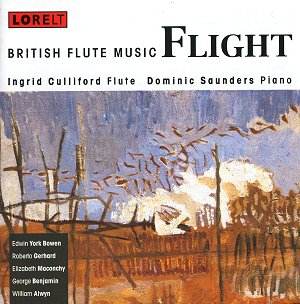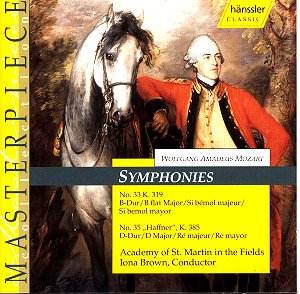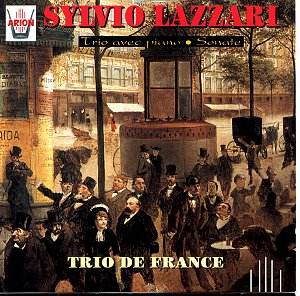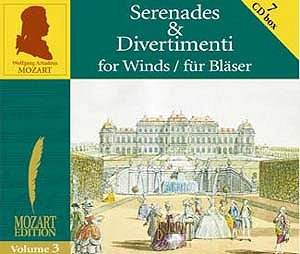 Composer: Various
Composer: Various
Works: Bowen – Sonata for Flute and Piano Op.120 (1946), Miniature Suite for Flute and Piano (1907); Gerhard – Capriccio for Solo Flute (1949); Maconchy – Colloquy for Flute and Piano (1978/9); Benjamin – Flight (1989); Alwyn – Sonata for Flute and Piano (1948)
Performers: Ingrid Culliford (flute), Dominic Saunders (piano)
Recording: St Silas Church, London
Label: LORELT
The collection of British flute music presented in this recording offers a compelling survey of the evolving voice of British composition from the early 20th century through to the late century. Each piece, performed by flutist Ingrid Culliford and pianist Dominic Saunders, not only showcases the technical demands placed upon the flautist but also reflects the stylistic shifts within the British musical landscape. The recording is particularly significant as it brings together works from composers like York Bowen, Roberto Gerhard, Elizabeth Maconchy, George Benjamin, and William Alwyn — each contributing uniquely to the flute repertoire.
Bowen’s Sonata for Flute and Piano Op.120 stands as a testament to his mature compositional style, characterized by its lyrical melodies and rich harmonic language. The three movements juxtapose tunefulness with moments of introspection, and Culliford’s interpretation brings a warm expressiveness to the melodic lines. The performance’s meditative second movement is particularly noteworthy; here, Culliford’s breath control and dynamic shading convey a deep sense of longing, while Saunders’ piano part complements with a delicate yet supportive undercurrent. The Miniature Suite, on the other hand, is imbued with a neo-classical charm, and the duo’s playful articulation in the final movement captures Bowen’s lighter, more whimsical side.
Gerhard’s Capriccio presents a stark contrast, showcasing a freer rhapsodic structure that invites interpretative liberty. Culliford navigates the piece’s technical intricacies with remarkable agility, particularly in the rapid passages where the flute dances above the piano’s robust textures. The engineering of the recording highlights the interplay between the instruments, allowing for the subtleties of Gerhard’s folk-like motifs to emerge distinctly.
Maconchy’s Colloquy, commissioned by Culliford herself, marks a shift towards a more austere compositional approach. The piece exhibits a compressed musical language that requires a nuanced interpretation. Culliford’s performance reveals the work’s emotional depth, particularly in the moments of tension between the flute and piano. The clarity of articulation and the careful pacing highlight Maconchy’s melodic lines, which, while terse, resonate with profound meaning.
George Benjamin’s Flight is perhaps the most innovative of the set. Written when he was just nineteen, it reveals a composer already in command of his craft. The piece’s lyrical passages juxtaposed with its rhythmic complexity demand a high level of technical proficiency, which Culliford delivers with ease. The recording captures Benjamin’s intricate textures with clarity, allowing listeners to appreciate the delicate balance of lyricism and instrumental flair.
William Alwyn’s Sonata for Flute and Piano, though less frequently performed, provides a satisfying conclusion to the program. The work’s single movement unfolds in three distinct sections, with the Allegro ritmico e feroce showcasing Alwyn’s neo-classical influences. Culliford’s interpretation is both spirited and thoughtful, ensuring that the fugue elements emerge with clarity amidst the exuberant passages.
This recording is not merely a collection of pieces but rather an insightful journey through the capabilities of the flute and the creativity of British composers across several decades. The technical proficiency of Culliford, paired with Saunders’ sensitive accompaniment, creates a cohesive listening experience that both honors the composers and invites new appreciation for their works. The sound quality is commendable, allowing for a rich auditory experience that captures every nuance of the performance. The LORELT label continues to enhance the visibility of British classical music with this thoughtfully curated release, making it an essential addition to the repertoire for flute enthusiasts and casual listeners alike.



